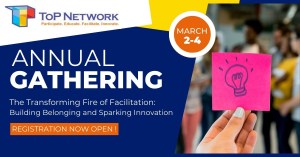Thank you to SessionLab for sharing the outcome of their first comprehensive survey on the state of facilitation, 2023 edition, and for the opportunity for me to share my own reflections in the Resources & Communities section on How do facilitators keep learning? – see below.
It is a comprehensive survey indeed, rich with insight and with much food for thought for all of us who are seeking to promote the power of facilitation worldwide. The report is timely, too, as the global Board of the International Association of Facilitators meets in Kuala Lumpur this week.
A further reflection of mine, on reading the whole of the report again, is to wonder how different the results might be if the survey were designed to be read and responded to in multiple languages, and circulated with the support of non-native English speaking facilitation communities such as local chapters of IAF and member ICAs of ICA International. I offer that as a challenge and opportunity for the 2024 edition!
 Meanwhile, you are (just!) in time to register for this year’s ToP Network Annual Gathering “The Transforming Fire of Facilitation: Building Belonging & Sparking Innovation”, a 3-day online conference of 150 or so practitioners of ICA’s Technology of Participation from next Thursday 2 March to Saturday 4.
Meanwhile, you are (just!) in time to register for this year’s ToP Network Annual Gathering “The Transforming Fire of Facilitation: Building Belonging & Sparking Innovation”, a 3-day online conference of 150 or so practitioners of ICA’s Technology of Participation from next Thursday 2 March to Saturday 4.
See you there? Registration closes next Monday 27 February!
How do facilitators keep learning?
I am pleased to see that so many people report here that they are participating actively in numerous communities, as I know from experience how enriching that can be. I am especially pleased to see that so many have access to a community of practice in-house, however, I hope that facilitators who are involved mainly in their in-house communities do get out as well. I say this as an encouragement to take the opportunity to learn with and from others who work in different ways and in different contexts to their own.
 I am sorry to see so many participating actively in no communities at all. While there is much to be learned from books, courses, and all the other resources mentioned, I think there is no substitute for active participation when it comes to developing and improving skills in facilitating just that.
I am sorry to see so many participating actively in no communities at all. While there is much to be learned from books, courses, and all the other resources mentioned, I think there is no substitute for active participation when it comes to developing and improving skills in facilitating just that.
I also notice here, as a facilitator with long involvement in ICA and long specializing in its ToP methodology, something very particular that seems to be missing. As many as 53 respondents report in 2.4 that they have ToP facilitation certification, and no less than 115 in 6.1 that they use ToP methods: great that so many ToP facilitation colleagues responded to the survey! Yet, not a single one refers here in 7.2 that ICA or the ToP Network are professional communities that they are actively participating in. I find that very curious, since I know that so many do.
I wonder what we regard as active participation, and what we regard as professional communities/organizations, to affect our responses to such a question. My own conviction, and my own experience from many years of active participation in ICA and IAF in particular, is that there is much more professional development to be gained from actively collaborating with professional peers than there is from passively receiving ‘professional development’ services and resources.
That is why I see volunteering opportunities as one of the greatest benefits a professional association such as IAF can provide its members. And that is why I have always volunteered and encouraged others to do so – so much so, in fact, that my name came to be used when I was Chair of IAF England & Wales as short-hand for the experience of finding oneself to have volunteered unexpectedly for a certain role (to be “Gilbraithed”!). In that spirit, if you haven’t been drawn into a community yet, I hope you will soon!
See also about me, how I work, who I work with and recommendations & case studies, and please contact me about how we might work together.


